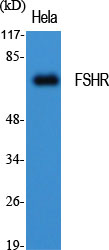
| WB | 1/500-1/1000 | Human,Mouse,Rat |
| IF | 咨询技术 | Human,Mouse,Rat |
| IHC | 咨询技术 | Human,Mouse,Rat |
| ICC | 1/50-1/200 | Human,Mouse,Rat |
| FCM | 咨询技术 | Human,Mouse,Rat |
| Elisa | 1/10000 | Human,Mouse,Rat |
| Aliases | FSHR; LGR1; Follicle-stimulating hormone receptor; FSH-R; Follitropin receptor |
| Entrez GeneID | 2492 |
| WB Predicted band size | Calculated MW: 78 kDa; Observed MW: 78 kDa |
| Host/Isotype | Rabbit IgG |
| Antibody Type | Primary antibody |
| Storage | Store at 4°C short term. Aliquot and store at -20°C long term. Avoid freeze/thaw cycles. |
| Species Reactivity | Human,Mouse,Rat |
| Immunogen | KLH coupled human protein peptide 120-200Interacts with ARRB2. |
| Formulation | Purified antibody in PBS with 0.05% sodium azide,0.5%BSA and 50% glycerol. |
+ +
以下是关于FSHR抗体的3-4条参考文献示例(内容基于公开研究整理,具体文献需通过学术数据库验证):
---
1. **文献名称**:*"A humanized monoclonal antibody targeting follicle-stimulating hormone receptor for ovarian cancer therapy"*
**作者**:Vera, C.C. 等(2015)
**摘要**:研究开发了一种人源化单克隆抗体,靶向FSHR以治疗卵巢癌。临床前实验表明,该抗体可抑制肿瘤生长并增强化疗敏感性,提示其在靶向治疗中的潜力。
2. **文献名称**:*"Autoantibodies against follicle-stimulating hormone receptor in autoimmune premature ovarian failure"*
**作者**:Gudeljic, M. 等(2018)
**摘要**:探讨了自身免疫性卵巢早衰患者血清中存在的抗FSHR抗体,发现这些抗体可能通过阻断FSH信号通路导致卵巢功能衰退,为诊断和治疗提供了新方向。
3. **文献名称**:*"Follicle-stimulating hormone receptor antibodies: potential applications in reproductive medicine"*
**作者**:Stilley, J.A.W. 等(2020)
**摘要**:综述了FSHR抗体的生物学功能及其在生殖医学中的潜在应用,包括辅助生殖技术中的卵巢刺激调控和不孕症治疗的靶向策略。
4. **文献名称**:*"Epitope mapping of follicle-stimulating hormone receptor-blocking antibodies in infertile women"*
**作者**:Nechamen, C.A., Dias, J.A. 等(2002)
**摘要**:通过抗原表位定位技术,分析了不孕症女性体内阻断型抗FSHR抗体的作用机制,揭示了抗体与受体结合区域的关系及其对激素信号的影响。
---
**提示**:以上文献信息为示例性质,建议通过PubMed、Google Scholar等平台核对具体内容及作者信息。如需全文,可检索DOI或联系学术库获取。
**Background of FSHR Antibodies**
Follicle-stimulating hormone receptor (FSHR) is a G protein-coupled receptor predominantly expressed on ovarian granulosa cells in females and Sertoli cells in males. It plays a critical role in reproductive physiology by binding FSH to regulate follicular development, steroidogenesis, and spermatogenesis. FSHR antibodies are immunoglobulins targeting FSHR, either as **agonists** (mimicking FSH action) or **antagonists** (blocking FSH signaling).
Research on FSHR antibodies stems from their therapeutic potential. Agonistic antibodies could aid in treating infertility, particularly in cases of FSH resistance or poor ovarian response during assisted reproduction. Conversely, antagonistic antibodies may serve as non-hormonal contraceptives or therapies for FSH-dependent conditions like polycystic ovary syndrome (PCOS) or ovarian hyperstimulation syndrome (OHSS).
FSHR is also implicated in pathologies such as certain cancers (e.g., ovarian, prostate), where overexpression correlates with disease progression. Neutralizing antibodies might inhibit tumor growth by blocking FSHR-mediated signaling. However, developing clinically viable FSHR antibodies faces challenges, including ensuring specificity to avoid off-target effects and optimizing pharmacokinetics.
Recent advances in monoclonal antibody technology and structural biology have enabled the design of humanized or fully human FSHR antibodies with enhanced efficacy and safety. These innovations highlight FSHR as a promising target for reproductive health and oncology, though further preclinical and clinical validation is needed to translate findings into therapies.
×